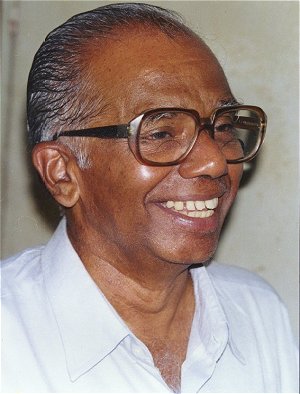Interview with Suryanath Kamath
Dr. Suryanath U. Kamath (not to be confused with Dr. Krishnanand Kamat, the principal creator of this website) is one of the foremost historians of Karnataka. He served as the Director of Karnataka State Gazetteer and was responsible for many a new research on the history of Karnataka. He is currently the Director of Raja Ram Mohan Roy Library in Calcutta. A simple and upright man, Dr. Kamath's own life's story is an eventful saga of struggle and achievement.
Vikas Kamat caught up with Suryanath Kamath in Bangalore. Excerpts:
Interview conducted on Dec. 21, 2000
Page Last Updated: December 07, 2024
© K. L. Kamat

Suryanath Kamath
Vikas Kamat: On numerous occasions, people have mistaken you to be the husband of my mother (due to the same last name and common fields of study) and I have a hard time explaining that we are not related. Do you also have similar experiences?
Suryanath Kamath: Ha ha ha!! Your mother wrote a very funny story about that once... and your father complained that people only mistake him to be me and never vice versa! Exactly one week after I heard this story, I got an official letter at the Department of State Gazetteer. It was addressed - Dr. Krishnanand Kamat, Director - Karnataka State Gazetteer !!!
VK: You have worked as a teacher, a journalist, have written novels, researched history, developed volunteer institutions like The Mythic Society, directed large government organizations, and are now heading the largest scholarly library in India. What would you consider to be your forte?
SK: History is my area. Be it economic history, social history, history of Karanataka or of the freedom movement; Indian history is my passion.
VK: How did you become interested in history?
SK: I was interested in learning since my childhood. Actually I was a student of Economics in Dharwad and came under the influence of such great teachers like Prof. Saletore. I was greatly inspired by the history of Karnataka and by the fact that nobody had undertaken its study on a broad basis.
I encourage you to read my autobiographical essay "In Retrospect" (Hindirugi Nodidaga in Kannada), where I have listed the various bends and turns of my life that pushed me towards the field of History.
VK: I have read your essays on the history of the Konkanis, the freedom struggle, and on royalty. Do you have any favorite topics within history? And also tell us something about your approach to history.
SK: I'd have to say the field that interests me most is the history of India's freedom movement. This is because India's freedom movement was a movement of the common man. Literate, illiterate, rich and poor alike participated in liberating our country. For my research, I interviewed hundreds of satyagrahis (soldiers of non-violence) which was truly fascinating.
Many historians only rely on inscriptions and great literary works of the period to write history. I have found history unfold in most common of the sources like temple newsletters, household documents, and through oral history passed from generation to generation. In my research, I try to find out what causes social change.
VK: So what causes social change Dr. Kamath?
SK: The circumstances do. Political suppression, economic hardships, or even economic prosperity for that matter, causes the society to change. Great leaders are required to herald those changes, but voluntary participation of common man is the driving force behind dramatic changes.
VK: What is the future of study of history in India? Is there interest among students in the history of India?
SK: The interest is limited to getting through the competitive examinations for civil services and entrance tests -- so the interest is shallow.
Indian history as a research field is in a pathetic state being infested with caste politics, attempts to distort history to please a ruling class or caste. In terms of numbers, we are producing a number of Doctoral theses, but most lack scholarly depth and are worthless.
VK: Why is this so? and what can be done?
SK: When I grew up, we were poor. But there were so many peer mentors and elders for us to look up to. Mentors with great character and devotion to learning who loved to share their knowledge and encourage the young minds. I feel this is lacking for the present day youngsters. I agree that there are new tools in the form of electronic media, but this human mentorship is missing.
We need to strengthen our academic institutions like The Mythic Society. The volunteers of organizations such as RSS need to rise to occasion to influence young minds into greater values of life. The school teachers can play an important role too.
VK: Thank you very much. Namaskaru.
References:
- Suryakirti -- Suryanath Kamath Felicitation Volume, P. V. Krishnamurthy and K. Vasanthalakshmi (Editors), 2000
See Also:
-
India's Greatest Historian -- interview with R.C. Majumdar
-
Biographies of other historians: Vinayak Savarkar, Damodar Kosambi, Bhaskar Saletore
-
Tryst with Destiny - the story of India's freedom struggle at Kamat's Potpourri
-
India's Historians -- biographies and interviews with other historians

